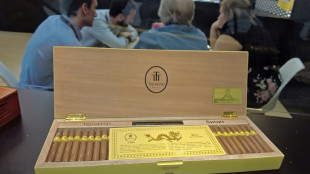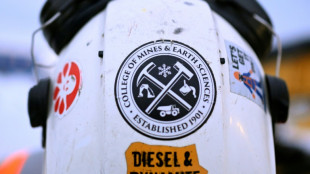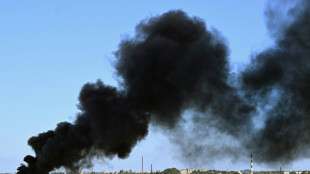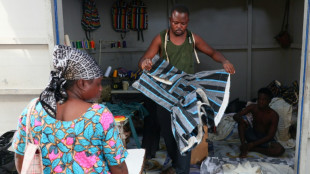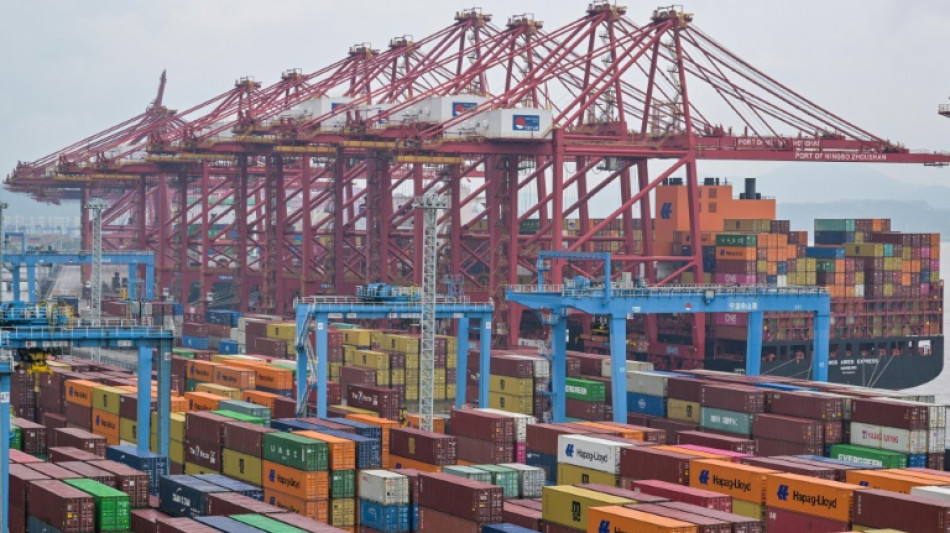

Chinese exporters "on hold" despite US tariff relief
Chinese exporters in one of the world's busiest port cities spoke Thursday of murky horizons as they try to navigate the trade maelstrom unleashed by the ever-changing saga of US tariff policy.
Suppliers in the eastern city of Ningbo -- home to the world's third biggest container port -- have had a wild ride since US President Donald Trump announced sweeping duties on nearly all trading partners in April.
On Wednesday a federal court blocked most of the US tariffs, including ones imposed on China separately using emergency powers, but that news failed to give much solace.
"Due to the Trump administration's appeal, there is uncertainty in tariff policy, so we remain cautious," said Han Zhongkai, an employee at a technology company that makes products like smartwatches.
Exporters at a bustling cross-border trade fair in Ningbo who spoke to AFP said they were stuck in port -- both metaphorically as they surveyed an uncertain future, and in some cases quite literally.
Following Trump's levies announcement in April, Beijing and Washington became enmeshed in a tit-for-tat escalation that saw tariffs soar into triple figures on each side.
"(US clients) stopped ordering. Before this, many foreign customers had already sent their goods to our domestic warehouse and were ready to ship them out," said 28-year-old Li Jie, who works for shipping company Freight Service Limited.
After the tariff increase, "they informed us that -- for the time being -- we should keep the goods in our warehouse".
Hundreds of exporters selling everything from furniture to small electronic devices and baby toys jostled for attention in the expo hall, trying to capture potential clients' attention.
The reciprocal tariffs have already been slashed for 90 days after a meeting between Chinese and US officials in Geneva in May, but uncertainty remains.
"Orders from the United States have essentially been put on hold," said company owner Xiao Chuan, sitting at his booth displaying multicoloured LED neon signs in different languages.
"One order was nearly ready to be placed, but may be delayed due to tariff concerns. Since the recent tariff policy adjustment, (clients) are adopting a wait-and-see approach -– unsure if further changes might occur."
- 'Slapdash operation' -
Faced with the unpredictability of the US market, many have looked to offload their wares elsewhere.
Chinese exports to Thailand, Indonesia and Vietnam surged by double digits in April, attributed to a re-routing of US-bound goods.
"Southeast Asian countries have actually gained quite significantly. Many factories are gradually shifting their sourcing away from China, placing manufacturing orders in Southeast Asian nations instead," said Li.
At a container depot near Ningbo's vast port, an employee who gave his surname as Huang said he thought manufacturers were on a mission to diversify.
"The world doesn't revolve around America alone. We'll ultimately find alternative outlets to redirect these products," he told AFP.
Hundreds of containers, including pink ones from Japanese company ONE, baby blue from Denmark's Maersk and maroon from South Korea's HMM, were neatly stacked on top of each other around him.
However, daily order volumes had decreased recently, said Huang.
"Although tariffs have now been lowered, uncertainty remains about potential future increases," he said.
A spike in US-bound shipments when tariffs were slashed in May was just a blip, likely just backlogged orders and earlier negotiated deals.
After a couple of days, "things levelled off".
Xiao, the LED neon light vendor, said he thought new orders would come only when tariff policy stabilised.
And so all eyes are on Washington's next move.
Huang said he thought US-bound shipping would probably continue, but with "tighter profit margins and reduced volumes".
"I don't find American credibility particularly trustworthy these days," he said.
"Honestly, the US government often feels like some slapdash operation –- all over the place."
Ch.Vogt--VZ
